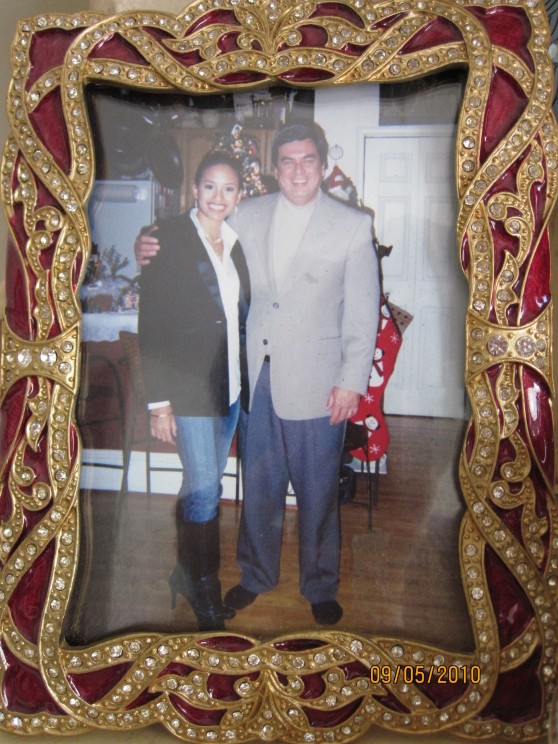…or you might wind up drowning in the ocean…like Natalie Wood.
The trick to enjoying celebrity and wealth is not allowing either to take on a life of its own. Unfortunately, too many in Hollywood lose their real identities to the ones portrayed on the screen, whether it’s in the movies or on television. Once he or she is bitten by fame, there’s an overwhelming desire to keep it going…at any cost.
Goodbye Natalie, Goodbye Splendour by Marti Rulli with former Splendour Captain Dennis Davern, reads like a thriller-soon-to-be made into a movie. Why it never made it that far is a puzzle all by itself. Probably because celebrity and wealth bought everyone’s silence…most of all…Hollywood’s.
After all, Robert Wagner was one of Hollywood’s own.
Too many lives, big and small, would have been affected…negatively. The tentacles of celebrity and wealth are far-reaching as was evident in the mysterious circumstances surrounding the death of Natalie Wood.
True. Natalie Wood was one of Hollywood’s sweethearts, ever since she charmed her way into our homes and hearts as the beguiling Suzy Walker in Miracle on 34th Street, an iconic favorite at Christmastime. However once Natalie Wood was found dead, there was no bringing her back. So why destroy another Hollywood star in a sordid investigation that would leave the public wondering about Tinsel Town’s morals. There was no fool-proof evidence of Wagner’s involvement in his wife’s death, so why have audiences turn away from the golden goose that was Hollywood for all who made a living within its protective confines.
What about those charged with investigating the death of Natalie Wood? Good question.
Remember Marilyn Monroe? O.J. Simpson? Robert Blake? Michael Jackson? What they all had in common was celebrity and wealth…in varying degrees. Nonetheless, it seems anytime someone famous is involved…the rules go…bye-bye.
Everyone involved in solving the case is entangled in the celebrity and wealth surrounding the high profile personality. Whether it’s that they are overwhelmed and intimidated by the fame, or they want some of it to rub off on them.
Goodbye Natalie, Goodbye Splendour makes a compelling case against Robert Wagner as the person responsible for the death of Natalie Wood.
The only person alive–Robert John Wagner–who undoubtedly knows how Natalie Wood got into the water, will obviously never talk about it, so exactly how Natalie got into the water may never be known, but what is known is that Wagner was with her when the “mystery” was born. What is known is that Wagner argued terribly with his wife. He was raging mad and acted upon the rage by taking a marital fight out to an open deck on his yacht. His wife was in her nightgown, arguing with him. Minutes later, she was in the water–wearing her coat–and crying to be saved.
The “mystery” of Natalie’s death would not have been too difficult to solve, certainly not for a police department and a medical examiner’s staff, had they pursued every angle of the case together. Many novices have no trouble solving it through the use of common sense. It seems the public is all that Natalie has left.
Wagner has never addressed his drastic delay in searching for Natalie. No one asks him for details. His fans defend that waiting for hours is logical, even though the number one rule in boating is to call for immediate help when someone is missing. Dennis Davern knows the proper procedures to follow when someone is missing from a boat. Wagner’s refusal to allow Davern to search for Natalie indicates that he did not want his wife to be helped: perhaps not ever to be found. Natalie’s jacket kept her afloat, helping her to be found shortly after a proper search.
Wagner then still balked on calling for professional help when harbormaster Doug Oudin pleaded with Wagner after three o’clock in the morning to allow him to call the Coast Guard. The harbormaster waited for Wagner’s approval.
Avalon Sheriff Kroll saw the inside of Splendour–the broken glass, the master stateroom in disarray–and ignored it.
While Baywatch divers hunted for Natalie beneath Splendour, diver Roger Smith said he was angry that professional help had not been called for sooner. Smith had asked Bombard not to touch Natalie’s body. “Homicide might be involved,” Smith had said. Smith obviously suspected something sinister.
Everyone’s peculiar deference to Wagner carried on throughout the morning, as each and every official in contact with Wagner after Natalie’s bruised dead body was found felt the loss of this remarkable woman and thus related to the pain they believed Wagner endured. Everyone allowed the man with the “most pain” to direct the aftermath of his wife’s death. Wagner’s grief was apparent to Duane Rasure, and although Wagner had primed Davern on what to tell authorities and on what not to offer, Rasure had been so overwhelmed with Wagner’s suffering that he let it slide when Davern reacted to Rasure with nervousness, offense, and outright lies. Rasure got mad at the “lanky, drunk guy from New Jersey” instead–and has stayed mad at him.
Wagner wanted off the island. A private helicopter was summoned. Wagner did not want to be interviewed by Rasure. Rasure let him go home. Legal assistance was ready and waiting for Wagner and Davern at Wagner’s front door. It’s what money can buy. All of the right people made the wrong decision to allow Robert Wagner to direct a crime scene.
Celebrity privilege was indeed alive and thriving on the morning of November 29, 1981, at the Isthmus of Catalina Island aboard the moored boat, Splendour. Celebrity “get out of jail free cards” may as well have been issued. Years later, when Davern told the truth, he was threatened with criminal charges and jail time if he changed the story that the attorney provided by Wagner had prepared for Dennis in 1981. Years later, that same attorney cooperated with Davern’s choice to speak with a writer from Vanity Fair.
What’s bizarre is that Robert Wagner told Davern to accompany the authorities and identify Natalie Wood’s body.
Dennis, unable to bring his eyes to focus on her, choked out, “It’s her.”
“You’ll have to look at her, Mr. Davern,” he was told. …
Dennis trembled as he forced himself to move his eyes from Natalie’s torso to her face. Her arms were exposed, and he saw the bruises. The fronts of her legs also showed bruises, far too many. Dennis wondered why her nightgown had not been pulled down to cover her exposed legs. He caught his breath when he saw that her eyes were still open. Her face appeared swollen, but not deformed, a bit greenish white in color, and her mouth had gone limp. She looks at peace, though, he tried to convince himself.
He dropped his eyes and whispered, “Yes, It’s Natalie Wood.”
Someone took hold of Dennis’s elbow to lead him away, but he pulled back and looked again at Natalie. He scanned his eyes across her body and concentrated on her legs and arms, noticing even more bruises. He started to count. One, two, four, seven…ten…he had seen enough, but there were more, including a scrape on her left cheek.
Neither the author, Marti Rulli, or I for that matter, is claiming that Robert Wagner did not love Natalie Wood. Far from it, the man was possessive of his wife and his jealousy got the better of him.
After years passed, it became easier to convince himself that his anger and actions were justified. And to write the autobiography he presents in 2008 shows that he thinks he is utterly immune to doubt and suspicion. He had wanted to stop books and movies and other people from telling about their lives. He had asked people in show business to stay away from people he disliked. He wants the laws changed so that no one can reveal his true colors after his demise. He thinks he has gotten away with his part in Natalie’s death. And he indeed had a big part in it. He smashed a wine bottle, screamed profanities and fought a deadly argument with Natalie after she had gone to their stateroom to go to bed. She would have awakened the next morning if only her husband had left her alone. He took the fight to the back deck, and minutes later, Natalie was no longer on board. …
Actor Christopher Walken, the only guest aboard, was the person to whom Robert Wagner directed his rage after smashing the wine bottle across the table…”Do you want to fuck my wife, is that what you want?”
Since Natalie’s death, Wagner has been sheltered by his insider network of secrecy and privilege for so long he appears to believe in the image he has created for himself. He has never had to bear the brunt of a direct, in-your-face accusation or questioning. His media buddies and selected interviewers tiptoe around him as if a twenty-seven-year-old death can still shatter him. Interviewers start their questions with their sympathetic eyes and condolences even decades later, as if Wagner is still the victim of love lost and innuendo. Wagner interviewers rarely express sympathy for Natalie’s experience. It is Wagner they have coddled, while Natalie is the truest victim.
The saddest thing about the entire affair is that Natalie Wood’s worst nightmare…dying in dark water…could have been averted.
Marilyn Wayne and her fiance, businessman John Payne, anchored in a sailboat within earshot of the Splendour, had heard someone calling out for help.
…they were sleeping in their stateroom aboard John’s forty-two-foot sailboat, the Capricorn, which was equipped with a silent generator. John always slept with an open window in his cabin, and this night, despite the rain, was no exception. A distant voice, crying for help, awakened him. John sat up to listen intently. “Help me, someone please help me,” he heard again. He awakened Marilyn and asked her to listen. Alarmed, Marilyn called out to her young son, Anthony, who also heard the cries. He wore a digital watch, and Marilyn asked him for the time. It was just minutes after eleven o’clock.
The cries for help continued. John went to the control panel and switched on their beam light. Marilyn went on deck to look toward the sound, but it was dark and damp, and she could not see anything. Marilyn had a bead on the plaintive cry for help, though, and thought if she swam just about forty feet, she might be able to help. Marilyn, an avid and strong swimmer, told John she wanted to jump into the water and swim toward the cries, but John convinced her it could be too dangerous. “You have Anthony to think of. Whoever’s out there could pull you under too.” He persuaded her to stay on board. They called the harbor patrol but no one answered. They called the sheriff’s office in Avalon, twelve miles away, and the person who answered told them a helicopter would be sent. They heard loud music, too, so they thought there was a party on a nearby boat.
Then they heard a man’s voice, slurred, and in an aggravated tone, say something to the effect of “Oh, hold on, we’re coming to get you.” Marilyn was not sure of the exact words used, but there was no mistaking that it was a man’s voice, and he sounded miserable.
But the woman’s cries continued: “Someone please help me, I’m drowning, please help me.” The voice did not seem to be moving further away. It was clear and concise.
For fifteen minutes, John and Marilyn felt helpless as they waited for a helicopter that never arrived. Their dinghy had already been deflated for the night and would take more than a half hour to prepare, so they were at a loss to help. After a fifteen to twenty minute wait, the cries for help ended. A few minutes later, the music ended too. There was utter silence–a haunting kind of silence. Terribly disturbed, John and Marilyn could only hope that the pleas had stopped because of a rescue. They went back to their stateroom for a terribly restless sleep.
The following morning the couple learned that Natalie Wood had drowned. “…they felt sickened by the news and had no doubt that it had been Natalie crying for help.”
Marilyn Wayne had believed the death was an accident and for a time felt sorry for Robert Wagner. However when neither she nor John were interviewed by the police even though they claimed to have talked with the couple, and when someone from the L.A. Times called to interview her, Marilyn became involved. She went so far as to call L.A. County Coroner Thomas Noguchi to “correct him on his ‘timeline,’ which she knew was off.” Although the authorities knew of Marilyn’s account, they chose to dismiss her. In fact “Detective Rasure was reported to have said that Marilyn Wayne was just someone who wanted her name in the papers–to be connected to a celebrity’s legend. Marilyn, like Dennis, had been bombarded with requests for interviews, but she never talked to anyone again” until contacted by another author who was writing a book about Natalie Wood.
Obviously someone didn’t want Marilyn Wayne to talk about what she knew.
“Three days after Natalie died, Marilyn found a scribbled message on a torn piece of paper…that read, ‘If you value your life, keep quiet about what you know.’ She immediately knew it was related to Natalie Wood’s death because that’s all anyone had been talking about. She suddenly became pretty vocal about letting everyone know she believed Natalie’s death to be accidental.
Marilyn Wayne was afraid.
When threats continued, she contacted her attorney to let him know about it and went so far as to make provisions in the event something might happen to her. John Payne did not experience any of that same kind of trouble, but John was a highly respected businessman, far wealthier than Robert Wagner. No one would bother John because of his status. Marilyn suspected she was targeted because she was the more vulnerable of the two.
In the end…
Because of the condition of Natalie’s lungs, indicating she had by legal definition drowned, and because the coroner decided the drowning must have been “accidental,” the cause of her entry into the water was neglected. There was no way to know if her death was accidental, and in view of all her bruises, “undetermined” was the only logical choice.
But we had a chief coroner being chased by celebrity.
…fame and wealth…is it worth it?
………hugmamma.





 She was obviously not prepared to be left behind, even though Bobby had gotten her pregnant when he was still married to his first wife, Emily Black, whom he had also left to marry again.
She was obviously not prepared to be left behind, even though Bobby had gotten her pregnant when he was still married to his first wife, Emily Black, whom he had also left to marry again.











